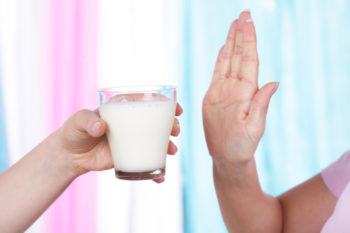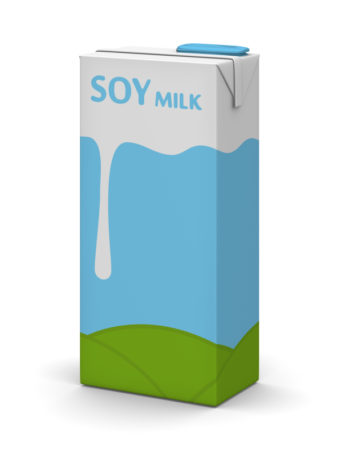Are you lactose intolerant? And how is the condition handled? Read on to find out more.
- How do I know if I have lactose intolerance?
Symptoms like bloating, headaches and irritable bowel syndrome can all be signs of sensitivity to dairy products or lactose intolerance. If you’re keen on trying to lead a dairy-free life, it’s important to know these basics before you start.
- What is lactose intolerance?
Lactose intolerance shouldn’t be confused with a milk allergy, which occurs when the immune system overreacts to the protein in milk. This is can be life threatening.
Lactose intolerance is much more common than milk allergy, and it’s basically an enzyme deficiency, where the body loses the ability to break down lactose — which is the sugar found in milk from all animals, including cows, goats, sheep, and humans!
- What food should I avoid?

Picture: iStock.
Unfortunately you can’t just avoid dairy products like cheese and milk. Many processed foods like flavoured chips and salad dressings use lactose and milk derivatives. Other foods that can surprisingly contain dairy include: crackers, pasta mixes, cereals, pesto and margarine.
- If you’re lactose intolerant, you may be able to eat dairy (wait, what?)
Hard cheeses, such as Parmesan, are quite low in lactose, and some people can eat cheese or even yoghurt without any repercussions. Equally, those who are sensitive to cows’ milk may be able to eat goat, sheep or buffalo milk without any side effects.
If you’re able to consume small amounts of milk in your diet, then consuming lactose as part of a meal or alongside high-fibre or low-GI foods can actually improve your lactose tolerance.
- Swap all milk

As mentioned, all animal milk contains lactose. So if small amounts of lactose affect you, try plant-based milks, such as rice, nut, oat, and almond or soya milk, instead — all of them are lactose free.
Check out our handy list of milk alternatives that should make living with lactose intolerance a little easier.
You can also buy lactose-free cows’ milk from certain specialty stores — have a look at this list of places to shop if you have special dietary requirements.
- Boost your calcium
Dairy products are an important source of calcium, which is essential for healthy bones and teeth, particularly in children, teens and young adults because their bones are still growing. It’s important to choose a milk alternative that’s fortified with calcium and vitamin D, because this facilitates the absorption of calcium.
- Keep checking ingredients
Some manufacturers change their recipes so always check the ingredients before you buy. While it may be obvious to avoid foods with “cows’ milk” listed on the label (a legal requirement in South Africa), you might have to also avoid foods that contain the following milk derivatives: animal fat, casein or caseinate, hydrolysed casein or whey, nonfat milk solids, lactalbumin, lactoglobulin, skimmed-milk powder, whey, lactose, curds and lactic acid.
If you want to go dairy free, but aren’t sure where to start, sign up to our #7Days #FreeFrom dairy newsletter. For one week, we’ll send you all the recipes, tips and inspiration you need. Sign up for free here.
DISCLAIMER: Before starting any diet, you should speak to your doctor. You must not rely on the information on this website/newsletter as an alternative to medical advice from your doctor or other professional healthcare provider.

